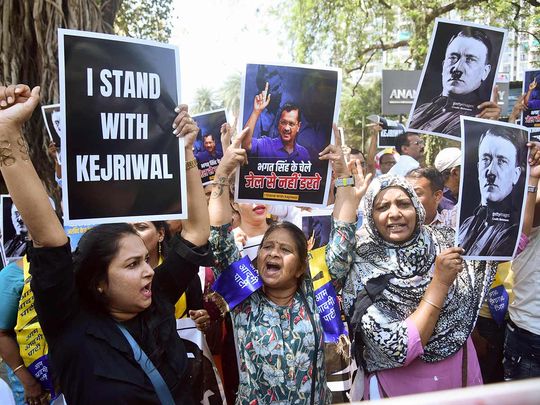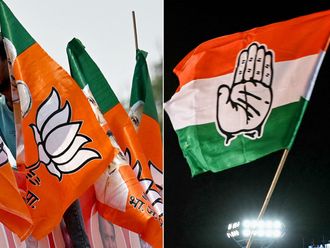
Arvind Kejriwal’s arrest on March 21 made headline news. Quite expectedly, because he is the serving chief minister of Delhi state, which is India’s capital. That an incumbent head of a state would be imprisoned in a jail complex which is under his own charge is supremely ironic.
But for him to continue to run the administration from prison is unprecedented. Unfortunately, even as his remand in Delhi’s Tihar Jail was recently extended to April 15, his continued incarceration is no longer headline grabbing. It has become another routine matter in India’s gargantuan and, at times, notoriously tardy legal system.
In Kejriwal’s case, whatever sympathy and political capital might have been made by this turn of events has, sadly for him, diminished by the day. Why? Because far from being contrite or cooperative, Kejriwal has been defiant and haughty throughout this alleged witch hunt by the ruling dispensation against him and his party. Kejriwal, who is the head of the Aam Aadmi Party (AAP) or the ordinary person’s party did not behave like an ordinary citizen when summoned not once or twice but nine times by the Enforcement Directorate (ED).
In retrospect, he might have scored many more political brownie points by presenting himself upon his very first summons. Immediately after, in a press conference, he could have declared his innocence, making all the arguments and noises that he and his supporters have been making now that he is actually imprisoned.
The truth is that the Prevention of Money Laundering Act (PMLA) under which he has been arrested is draconian. It shifts the burden of proof from the prosecution to the accused. Instead of law enforcement agencies having to prove guilt, the accused must, instead, prove his or her innocence.
Read more by Prof Makarand R. Paranjape
Cases filed by ED
Meant for money launderers, drug cartels, crime syndicates, and other hardened offenders, the PMLA has increasingly been used on opposition political parties by the ruling Bharatiya Janata Party (BJP). On several occasions, when those targeted by the Enforcement Directorate switched loyalties and joined the BJP, the charges against them were also deferred or dropped.
On the other hand, those who do not buckle, like another AAP leader, former Delhi Home Minister Manish Sisodia, continue to languish in jail. In this instance, for over two years. The charges against him and several others arrested by the ED are yet to be proven. Another state chief minister, Hemant Soren of Jharkhand Mukti Morcha (JMM), was earlier arrested by the ED and sent to jail. He resigned and handed over the reins of his government to Champai Soren, who shares is surname but is not related.
Since 2014, there has been fourfold increase in cases filed by the ED against opposition leaders. Of all those targeted from the political class, 95% belong to the opposition. When it comes to the ED’s conviction rate, the figures are abysmally low or astronomically high – it all depends on how you compute them.
According to information furnished to the Indian Parliament, since 2011, the ED conducted 1569 investigations and carried out 1700 raids. Of these, only nine resulted in convictions, which works out to less than 0.6%. The ED’s counter to the charge of political vendetta is that only 2.98% of its cases have been filed against former Members of Parliament (MPs) or Members of the Legislative Assemblies (MLAs). According to the ED only in 25 cases have charges actually been filed, with 24 of these resulting in conviction. This makes the conviction rate, if computed in this manner, to be as high as 96%.
When it comes to Arvind Kejriwal no charges have been filed so far. Whether he is convicted at all remains, therefore, to be seen. But the process is usually the punishment when the wheels of the law turn as slowly as they do in India. Kejriwal is behind the bars when the country is about to cast its ballot in the 2024 general elections.
For someone who began his career as an anti-corruption crusader, the reversal of fortunes could not be more incongruous, if not tragic. Even if Kejriwal is set free for lack of evidence, his – and I dare say his party’s – reputation is tarnished forever. This is not entirely surprising, however. No one in politics is expected to be entirely honest these days.
With Kejriwal and his party survive the current crisis? The story of AAP has been one of continuous attrition from its very inception. It has lost several key leaders and members. This erosion, bordering on disintegration, is more evident just now than ever before. Yet, I would wager that gleeful or sorrowful pronouncements of the doom and death of AAP are premature. Both Kejriwal and AAP will survive, even if considerably weakened or crippled.
Kejriwal himself, as well as his key cabinet members, have shown enormous resilience and persistence. Their support base, not only in the electorate, but also in wider international circles, cannot be wished away. What is more, Kejriwal is also a skillful political operator, next only to prime minister Narendra Modi. He will not give up or buckle down without a tough fight. At present, much more than legal, this fight is political, with the future of Kejriwal and AAP dependent as much on the results of the Lok Sabha polls as on what happens in the Delhi High Court.









